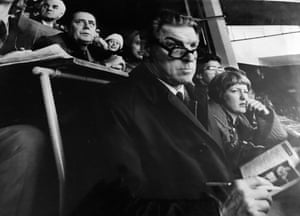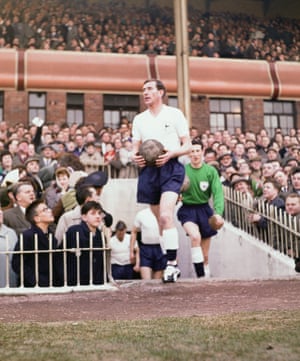Julie Welch can still remember how it felt to cover her first football game. Pushing through the press box, desperately trying not to bang into anyone or draw attention to the fact that she was not simply the only woman there, but the first to enter this most hallowed of spaces, terrified that she would find herself unable to write.
It was August 1973, Coventry City were playing Tottenham Hotspur and Welch, who was filing to the Observer, was 24. “Covering that first game, it almost felt like a bit of a dare,” she says, sitting in her house in Blackheath, south London. “Like a trick you might try out at school and see if you could get away with it. I expected someone to tap me on the shoulder and tell me I had to leave.”
The first woman to cover football for a national newspaper, Welch, 71, wrote about sport for the Observer for 11 years. Now she has written a memoir about that period, looking not only at her own experiences as a woman in what was then still very much a man’s world, but also at those of other trailblazing journalists from Valerie Grove, who began her career as the only woman on the Evening Standard’s Diary pages, to Wendy Holden, who spent a decade as a foreign and war correspondent at the Telegraph.

The Fleet Street Girls is both a witty love letter to a vanished era when typewriters clacked long into the night and the filing of copy was punctuated by reviving trips to El Vino’s wine bar, and an honest picture of an era when women writers frequently struggled to be taken seriously. They had to battle not only workplace misogyny but a wider society that wasn’t happy about women handling their own finances – let alone holding down high-powered jobs.
“I really wanted to ensure all sorts of stories were told,” Welch says of the decision to talk to a variety of women from celebrity interviewer Lynn Barber and former You magazine editor Sue Peart to long-standing Observer secretary Edie Reilly. “Partially because my own time in journalism was so short, and also wanting to show how much changed over that period – and how much didn’t.”
Her own experiences weren’t always pleasant. While the Observer sports desk, including the celebrated Hugh McIlvanney, were “marvellous”, not everyone was happy that a woman had been allowed to cover the beautiful game.
“I did find it really awful at times,” she admits. “One sports writer was just horrible. He used to go on about the Observer’s gimcrack football reporter. When I returned briefly during the Crazy Gang era, he got so outraged at seeing me again he actually shoved a chair into the side of my leg. I can’t quite bring myself to name him because I’m still a bit scared of him.”

While that particular reporter was an extreme case, plenty still refused to see her presence as anything more than a gimmick. “It was terribly frustrating, because I’d grown up loving the game. I had a brain, and I knew how to follow a match as well as any of the beardy, sweaty men alongside me.”
There were plenty of good times, however. Welch, who was 22 when she started at the Observer, working as secretary to the sports editor Clifford Makins, was newly married with a young son. She had suffered postnatal depression and says when she began her job “my world turned from monochrome into colour”.
“I still remember that summer’s day stepping out of Blackfriars station in my mini-dress and my silly shoes and hat and feeling this was it. The whole thing felt so wonderful.
“There was a romance to it, being part of that whole great Fleet Street tradition.” She breaks off and laughs: “Of course, in the first few years in particular I did spend most of my days completely pissed.”
A lifelong Tottenham fan – one of her first post-journalism jobs was writing the television play Those Glory, Glory Days about her teen passion for Danny Blanchflower – she grew up fascinated by the stories in football, “the way there were heroes and villains and crisis and redemption”. She got her break after Arthur Hopcraft, the Observer’s chief football reporter, said he was bored with covering matches.
From there interviews and profiles followed. She memorably convinced Leeds hard-man Norman “Bites Yer Legs” Hunter to open up about how emotional playing made him. , Irascible football manager Brian Clough and tennis legend Arthur Ashe would become godfathers to her two sons from her second marriage to Ron Atkin, who became the Observer’s sports editor after Makins left.
“I don’t think I can remember meeting a shitty footballer,” she says. “They were all just super.”
“I remember walking with Brian Clough one day and Lucas, my middle son, his godson, was there and he’s lovely with him, chucking him in the air, and I just said, ‘Oh Brian, you are a good man,’ and he laughed and said, ‘I wish I was, love, I wish I was.’ But to me he was. His wife, Barbara, was too. They were just nice people.”
She struggled after first leaving Fleet Street. “I felt it was time to try womaning. I’d married again and I wanted to stop travelling around, but I did find life outside really dull. I missed the conversation and the wit. It all just seemed a bit bland and colourless and I had no idea how to talk to the neighbours because I was still me – a bit weird and obsessed with sport and slightly pissed…”
She managed to adjust and carved out a solid career as a playwright and screenwriter. These days she writes books about her beloved Spurs and enjoys “ultra events”. “It used to be long-distance running, but now it’s more like long-distance walking,” she says, admitting she remains nostalgic for what once was, bad times and all.
“It sounds grim to say that there will never be another time in my life that felt like this, but it’s true,” she says with a wide grin. “Because I had felt as though I was dead, then I came alive again. In that sense walking into the Observer was like walking into heaven.” She laughs again. “When I look back, it really was such a marvellous life.”
• The Fleet Street Girls by Julie Welch is published by Trapeze Books (£16.99) To order a copy for £14.78 go to guardianbookshop.com. Free UK p&p over £15
from Football | The Guardian https://ift.tt/31197XT
via IFTTT

No Comment